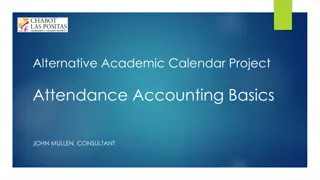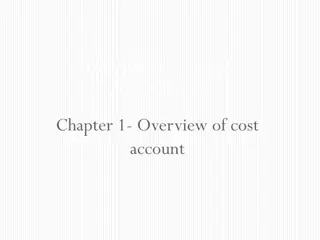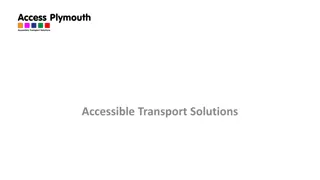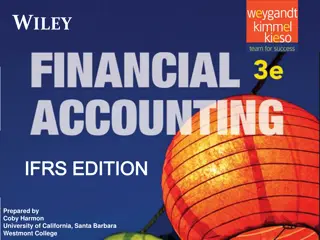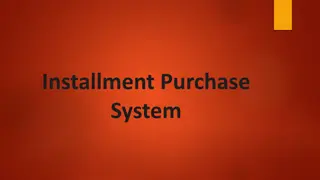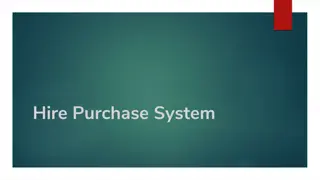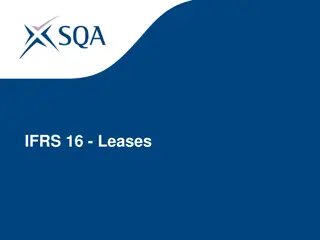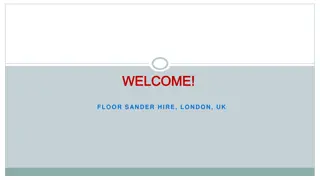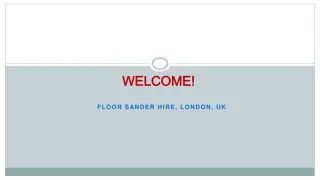Understanding Hire Purchase System in Financial Accounting
Hire Purchase System is a method of buying goods through installment payments, with ownership transferring to the buyer once the full amount is paid. The system involves a formal agreement between a seller and buyer, governed by specific laws. Features include possession transfer, credit purchase, termination rights, and installment payments covering both interest and capital.
Download Presentation

Please find below an Image/Link to download the presentation.
The content on the website is provided AS IS for your information and personal use only. It may not be sold, licensed, or shared on other websites without obtaining consent from the author. Download presentation by click this link. If you encounter any issues during the download, it is possible that the publisher has removed the file from their server.
E N D
Presentation Transcript
WELCOME Class: B.Com Part-1 Subject: Financial Accounting Topic: Hire Purchase System Meaning, Definitions and Features Prepared By Dr. SHAHID IQBAL Guest Faculty Marwari College, Darbhanga, Mobile no. and whatsup no. : 7004160257 Email ID: shahidlnmu@gmail.Com 1
Hire Purchase System Meaning: The term hirepurchase originated in the United Kingdom and this is similar to rent-to-own system in the United States of America. Hire Purchase System is a method of purchasing the goods with an arrangement to make payment (of the purchase price) in installments over time. The purchaser is, therefore, leasing the goods and does not obtain the ownership of the goods until he pays the full amount of the contract. However, physical possession of goods is given by the seller to the buyer immediately after the finalization and signing of the agreement called, hire purchase agreement. It (i.e., hire purchase system) is also defined as a system by which a buyer pays for a thing in regular installments while enjoying the use of it. During the repayment period, ownership (i.e., title) of the item does not pass to the buyer. Upon the full payment of the amount/loan, the title passes to the buyer. 2
Definition: According to J.R. Batliboi, Under the Hire Purchase System, goods are delivered to a person, so agrees to pay the owners by equal periodical installments, such installments to be treated as hire of those goods, until a certain fixed amount has been paid, when these goods become the property of the hirer. Features of Hire Purchase Agreement 1. Hire Purchase Agreement: There is an agreement between the seller (called, hire seller or hire vendor) and the buyer (called, hire purchaser or hirer) and this agreement is called, hire purchase agreement. 2. Transfer Of Possession Only: The hire vendor transfers only the possession of goods to the hire purchaser immediately after the agreement of hire purchase is made. 3. Governing Act: Hire purchase system is governed under the Hire Purchase Act, 1972. This act came into force on 1 September, 1973. 3
3. Credit Purchase: Hire purchase is a system of credit purchase. It implies that the goods are sold for payment that is to be done in future period of time. 4. Right To Terminate : The hire purchaser also has an option to terminate the agreement any time but before the payment of last installment and return the goods to the seller (if he is not willing and/or not able to pay the remaining installments) 5. Goods should be delivered in the possession of the purchaser at the time of commencement of agreement. 6. Hire Vendor continues to be the owner of the goods as the last payment of installment is over. 7. If there is default in the payment of any installment, the hire vendor will take away the goods from the possession of the purchaser without refunding him any amount. 8. Each installment consists of partly interest and part of capital payment. 9. Purchase price of the goods and services is paid in a number of agreed installments. That means, purchase price is not paid in one lump sum either at the time of signing the agreement or at a future date. Instead, it is paid in a few installments over a period of time. 4
Conditions Of Hire Purchase Agreement: Hire purchase is a transaction where the goods are sold by vendor to the purchaser under the following conditions: The goods will be delivered to the purchaser at the time of the agreement The purchaser has a right to use the goods delivered The price of the goods will be paid in the installments. Every installment will be treated to be the hire charges of the goods which is being used by the purchaser. If all the installments are paid as per the terms of agreement, the title of the goods is transferred by the vendor to the purchaser. Besides, the hirer has the right to buy the goods (purchased on hire purchase system) at any time before the payment of last installment. In this case, the hirer is expected to give at least 14 days notice to the hire vendor and he is eligible for the rebate. That means, the hirer has to pay the hire vendor only hire purchase price or the balance thereof as reduced by the rebate. If there is default in the payment of any of the installments, the vendor will take away the goods from the possession of the purchaser without refunding him any amount received earlier in the form of installments. 5
Important Terms Used In Hire Purchase Accounting: (1) Hire Purchase Agreement is an agreement under which goods are let on hire and under which the hirer has an option to purchase them in accordance with the terms/conditions of the agreement. (2) Hire purchase price (i.e., purchase price) represents the total sum payable by the hirer under a hire purchase agreement by way of a deposit or initial payment (called, down payment) and subsequent periodical installments. (3) Cash price represents the price at which the goods may be purchased by the hirer for cash (i.e., on cash basis). (4) Interest / hire purchase charges therefore, represents the difference between the hire purchase price of the goods and the cash price of the same goods. Hence, Interest = (Hire Purchase Price Cash Price). However, it (i.e., either interest or hire purchase price) does not include any amount payable by the hirer as penalty or compensation or damages for breach of any of the Provisions of the agreement. It is, therefore, represents the difference between the hire purchase price and the cash price of the goods sold on hire purchase system. 6
(5) Hirer or Hire Purchaser: means the person who obtains the possession of goods from the owner of the goods under hire purchase agreement. (6) Owner or Hire Seller or Hire Vendor: is the person who lets and delivers the possession of goods to a hirer under hire purchase agreement. (7) Hire: represents the sum payable periodically by the hirer to the hire vendor for the goods purchased under a hire purchase agreement. (8) Down Payment: is the amount paid by the hirer to the hire vendor at the time of signing the agreement or at the time of taking delivery of the goods by the hirer from hire vendor. (9) Installment: represents a part of the difference between the hire purchase price and down payment (payable by the hirer to the hire vendor periodically as per agreement). After making the down payment, the remaining amount (i.e., the difference between the hire purchase price and the down payment) of the hire purchase price is paid periodically (say, yearly, half-yearly, quarterly, monthly, etc) in few parts at the end of each of the period. (10) Repossession refers to the hire seller taking back the possession of the asset which was sold to the hire purchaser on hire purchase system for non- payment of one or more installments. 7

 undefined
undefined












